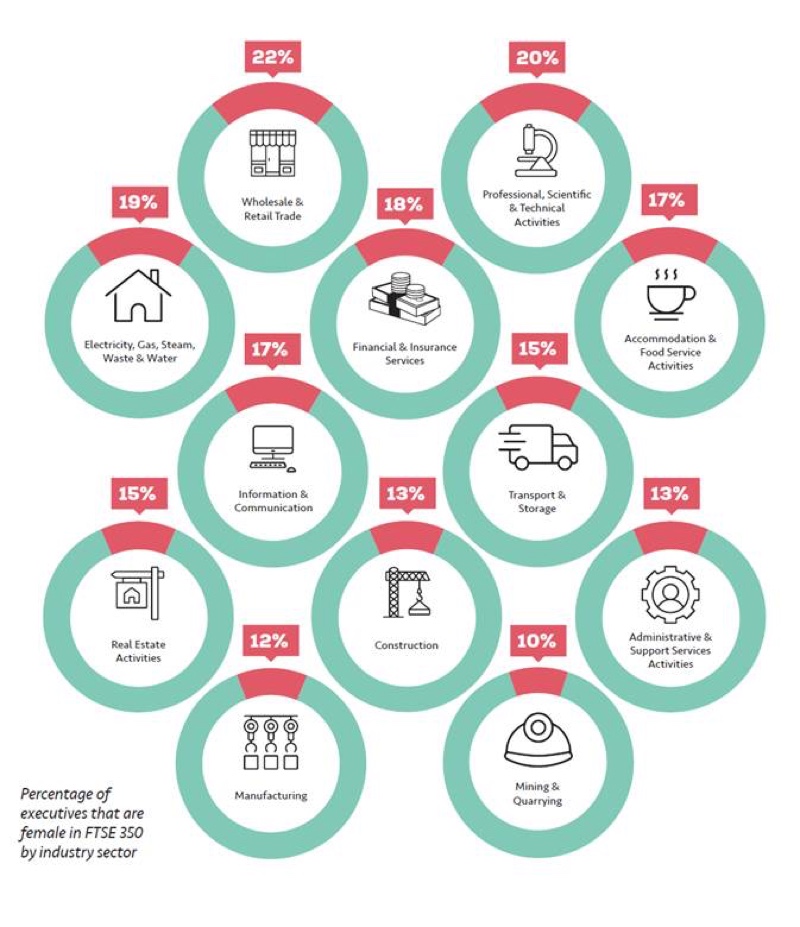In the last 3 years Women Count 2018 the third annual report by The Pipeline found there has been no progress on gender diversity in senior roles in the FTSE 350 – and by some measures, it is going backwards.

The annual report by The Pipeline tracks and analyses the number of women on executive committees of FTSE 350 companies. The report found that:
- the ratio of women on executive committees of FTSE 350 companies has stayed the same at only 16% since the first report 3 years ago
- 95% of all P&L roles on executive committees are held by men and just 5% by women, a decrease on last year – most women instead perform ‘functional’ roles such as HR, marketing, legal or compliance
- the percentage of women executives on main boards has flatlined at 8% between 2017 and 2018. This means 92% are still held by men.
Representation on executive committees, unlike representation on boards, is the best measure of gender equality in the FTSE 350, because executives have power in the running of a company.
This research found pharma has a higher representation of women on executive committees than the FTSE 350 average and their position has increased slightly since last year.

Lorna Fitzsimons, cofounder of The Pipeline said: “We are at a critical juncture for gender equality in the workplace and this report has issued a stark warning. This is an alarm bell for everyone who supports the Hampton-Alexander recommendation to Government to achieve 33% representation of women on FTSE 100 executive committees and their direct reports by 2020."
“Government and business leaders must sit up and take notice. If we carry on as we have been doing – we will miss these targets. This doesn’t just fail women but it fails us all and our economy too. The Women Count 2018 report lays bare how the lack of women in senior roles hits companies’ bottom lines – limiting the profitability of leading businesses and in turn, hurting UK plc in the pocket.”
Perhaps we are already seeing the positive impact of GlaxoSmithKline having a female CEO. Even so, this sector’s representation of women in P&L roles has to increase if these green shots are going to turn into a positive, sustainable trend.
- 25% representation of women on executive committees
- 8% representation of women in P&L roles on executive committees
- 10% representation of women as executive directors on boards
Analysis from the report also showed the demonstrable economic benefits for companies who have women in more senior roles.
There is a £13bn gender dividend on offer for UK plc, if all FTSE 350 companies performed at the same level as those with women on their executive committees.
FTSE 350 companies with no women on their executive committee only achieve an average 8.9% net profit margin. Where there are at least 25% women on executive committees, average net profit margins soar by 5%, to 13.9%.
The report also found that female CEOs are instrumental in recruiting more women to senior positions:
- female CEOs have more than twice the number of women on their executive committees than male CEOs
- female CEOs have four times the number of women executives in P&L roles on their executive committees compared to male-led companies
- only 4% of FTSE 350 companies have female CEOs, yet within a year these female CEOs have increased by 10% the average number of women executive committee members.
Rt Hon Nicky Morgan MP, Chair of the Treasury Select Committee said: “Women Count 2018 gives us the proof that having more women on executive committees boosts profitability. It unpacks in forensic detail the status of women in FTSE 350 firms, the number of women on executive committees, and the correlation between female representation and economic performance.
“This lack of progress calls into serious question the possibility of achieving the UK’s target of 33% by 2020 which I set in response to the Davies Report, as Minister for Women and Equalities in 2015. Businesses that don’t understand the need to appoint more senior executive women are failing to meet their full potential. I ask them to read this report and wake up to reality, in their own interests and the country’s interests.”
